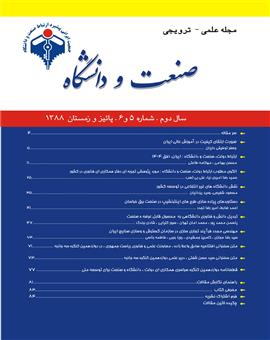الگوي مطلوب ارتباط دولت، صنعت و دانشگاه موردپژوهي تجربههاي دفتر همكاريهاي فناوري در كشور
محورهای موضوعی :حميدرضا اميري نيا 1 , علی بی تعب 2
1 - همكاريهاي فناوري رياست جمهوري
2 - دانشگاه تربیت مدرس
کلید واژه: دولت, صنعت, دانشگاه, نوآوري, مدل مارپيچ سهگانه,
چکیده مقاله :
مقالهی حاضر تلاش دارد با بررسي انواع الگوها و نظريههاي نوآوري از جمله الگوي خطي نوآوري، نظام نوآوري و مدل مارپيچ سهگانه، سير تحولي تعامل سه نهاد دانشگاه، دولت و صنعت را در سطح جهان و همچنين ايران مورد مطالعه قرار دهد و با انجام موردکاوي تجربههاي دفتر همكاريهاي فناوري، در زمينهی تعامل اين سه نهاد، شيوهها، روشها و الگوهاي حاكم بر اين تعامل سهگانه، در اين تجربهها را شناسايي کر ده و سازگاري آنها را مدل مارپيچ سهگانه نشان دهد. و در انتها بر اساس يافتههاي بدست آمده پيشنهادهاي سياستي مناسب را برای تعامل موفق دولت، صنعت و دانشگاه در ايران ارائه نمايد.
Today, innovation is considered to be the main factor affecting the long-term growth of nations. This, in turn, justifies the vast amount of studies this issue. Regarding the aforementioned prominence, the present study aims at investigating different theories and pattern for innovation at the national level including: linear model, systemic approach and triple helix. University-Industry-Government (UIG) linkage and its transformation in Iran more deeply is reviewed. Then, the experiences of Iranian presidency Technology Cooperation Office (TCO) are investigated. Finally, policy implications from the studied cases are mentioned as the conclusion
1. Amirinia, H., The Role of University-Industry-Government Relations in the Promotion of Industrial Innovation in Iranian Composite Industry. Submitted for the award of MSc by Research. David Livingstone Institute of Overseas Development Studies, Engineering Faculty, University of Strathclyde University (2003).
2. Etzkowitz, H., Academic-industry relations: a sociological paradigm for economic development. In Leydesdorff, L., Van den Besselaar, P. (Eds.), Evolutionary Economics and Chaos Theory: New Directions in Technology Studies. Pinter, London. pp. 139-151, (1994).
3. Etzkowitz, H., & Leydesdorff, L. (Eds.), Universities in the global economy: A triple helix of university-industry-government relations. Cassell Academic, London, (1997).
4. Freeman, C, The National Innovation Systems in historical perspective. Cambridge Journal of Economics, 19(1), pp. 5-24, (1995).
5. Freeman, C. Technology Policy and Economic Performance: Lessons from Japan. Pinter, London, (1987).
6. Kline, S. J., Rosenberg, N., An overview of innovation The Positive Sum Game. National Academy Press, Washington. DC., (1986).
7. Leydesdorff, L., Etzkowitz, H., Emergence of a Triple Helix of University-Industry-Government Relations. Science and Public Policy, 23, 279-86, (1996).
8. Leydesdorff, L., The New Communication Regime of University-Industry-Government Relations. In Etzkowitz, H. & Leydesdorff, L. (eds.) Universities and the Global Knowledge Economy: A Triple Helix of University-Industry-Government Relations. Cassell, London. pp. 106-117, (1997).
9. Lundvall, Bengt-Åke (Ed.), National Systems of Innovation, (1992).
10. Nelson, Richard R. (ed.), National Innovation Systems: A comparative study. Oxford University Press, New York, (1993).


